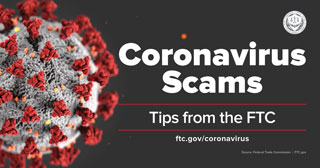Page Title

Reprinted from the Federal Trade Commission
May 27, 2020
Hey college students: even though you’re likely far from campus, scammers are still trying to find you.
Maybe you or your friends have gotten an email claiming to be from the “Financial Department” of your university. The email tells you to click on a link to get a message about your COVID-19 economic stimulus check — and it needs to be opened through a portal link requiring your university login. Don’t do it. It’s a phishing scam. If you click to “log in,” you could be giving your user name, password, or other personal information to scammers, while possibly downloading malware onto your device.
How can you spot and avoid scams like these? Before you click on a link or share any of your sensitive information:
- Check it out. If you have concerns about an email, contact the sender directly. Look up their phone number or website yourself. Don’t click on a link. That way, you’ll know you’re not about to call a scammer or follow a link that will download malware.
- Take a closer look. While some phishing emails look completely legit, bad grammar and spelling can be a tip-off to phishing. Another clue that the email is not really from your school: they use the wrong department name. In one example we’ve seen, the scammers called themselves the Financial Dept instead of the Financial Aid Department.
If you spot something that looks like a phishing scam, report it. Forward the message to the Anti-Phishing Working Group (an organization which includes ISPs, security vendors, financial institutions, and law enforcement agencies) at reportphishing@apwg.org. You can also report phishing to the FTC at ftc.gov/complaint.
In This Issue...
- FROM THE PRESIDENT
- President Tracy D. Hall serves on national ATD panel
- Welcome aboard, new team members
- Mental Health Corner: Tips to avoid burnout during summer semester
- FACULTY KUDOS: Julia Rhea selected 2020 Field Instructor of the Year
- FACULTY KUDOS: Dr. Robert J. Walker publishes textbook on effective teachers
- U.S. Census deadline extended to October 31 due to COVID-19
- COVID-19: Retrieving office mail from campus
- COVID-19 scams targeting college students
- Department of Education changes CARES Act student relief eligibility requirements
- Outstanding students honored at first virtual Honors Convocation
- TBR to use multiple measures for learning support placement
- Elections held for SGA and CAB student representatives
- Languages and literature department hosts inaugural student poetry contest
- Recruitment hosts live admissions sessions
- TSBDC assists small businesses seeking SBA disaster loans
- Career Services goes virtual to connect students, alumni and employers
- IAC Innovation Grant application extended to June 30
- Free online continuing education courses offered through June 30
- Tears and cheers at first-ever Curbside Cap & Tassel Pick Up event
- Forensics and criminal justice students compete in first SkillsUSA state competition
- Retention & Student Success welcomes IDEAS team members
- Virtual Spring Fling brings students together while apart
- Southwest’s TRIO graduates are “Upward Bound” for college
- ALUMNI NEWS: Former Lady Saluqi Ashley Shields new Arlington High girls basketball head coach
- Athletics department to pay tribute to health care heroes
- SALUQI CORNER: Saluqis conquer academic goals in spite of COVID-19
- Southwest: In the News